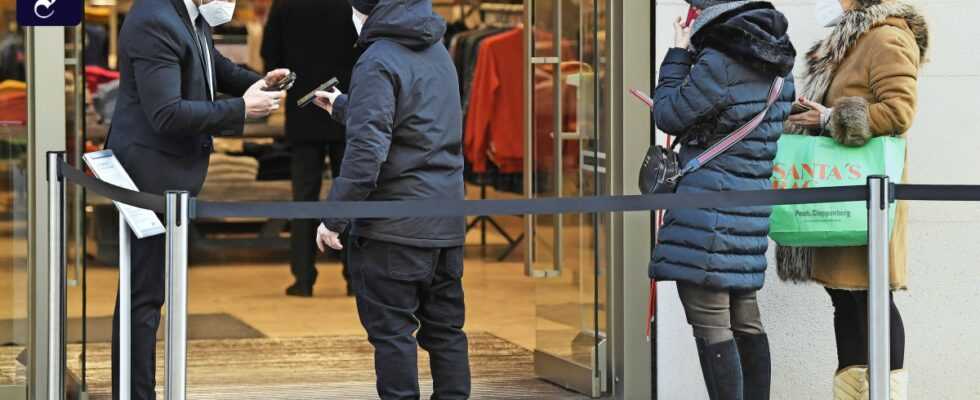Schilder at the store clearly instruct the consumer: “Vaccinated or recovered. In the event of non-compliance, no purchase is possible.” What has long been part of reality in Germany is now also mandatory in Austria. Since Tuesday, Austrian retailers have had to monitor compliance with the so-called 2-G rule in stores.
Retailers are thus obliged to ask customers for proof of vaccination or recovery. While in Germany there is usually a check in front of the shop door, in Austria a check can only take place when paying at the cash register. In addition, citizens in Austria must now also wear an FFP2 mask outdoors if they cannot keep a distance of at least two meters.
The fact that only vaccinated or recovered people are allowed to shop in stores has been the case since the fourth corona wave. However, the obligation to monitor is new. Those who have not been vaccinated can continue to buy everyday products in supermarkets or drugstore chains.
The controls are expensive for the traders
But not all dealers can afford additional staff for the controls, according to the industry. Small shops in particular are concerned about the costs. In many shopping centers there is already a joint solution. Customers can be checked for 2 G in the entrance area and receive a stamp with the date.
This means that all dealers in the center know that this customer has already been checked for 2G. In Germany, too, individual retailers in cities are trying to find a joint solution; in Frankfurt, for example, retailers distribute so-called 2-G ribbons to their customers after the first inspection. With this, the consumer can then simply shop in the surrounding shops without having to show the vaccination or health certificate again.
A question of task allocation
However, there is not yet a comprehensive solution in Germany: While Frankfurt introduced this solution in December, it is currently still banned in federal states such as Saxony. “I cannot understand the explicit ban on such a simple and business-friendly regulation as the Free State issued last week,” said Leipzig Mayor Burkhard Jung (SPD) on Tuesday.
The criticism of the 2-G regulation is great both in Germany and in Austria: The trade does not feel responsible for uncovering fake vaccination cards or recovery notices. “We will do our best, but we are not the police,” said the spokesman for trade in Austria, Rainer Trefelik. Traders who do not check the 2-G proof risk fines of up to 3600 euros. The trade association in Germany meanwhile complains about the low frequency in the city center – and sees this as mainly due to the restrictions. “2 G deters many customers from shopping, the consequences in retail and in entire city centers are fatal,” said HDE Managing Director Stefan Genth last week.
Read F+ now for 30 days for free and get access to all articles on FAZ.NET.
READ F+ NOW
But the tenor is not so negative everywhere: In the state of Salzburg, consumers have had to show 2-G proof in stores since the beginning of the month. Employees are obliged to monitor customers. And that seems to work without any problems – apart from a few unruly customers, as a survey by the Austria Press Agency showed on Tuesday.
Austrian dealers support measures
The tenor of the business people: You support the measures of the state and now the federal government. With a few exceptions, this is also accepted by customers. A good half a million people are employed in Austrian retail. It is the second largest employer in the market-oriented economy.
The tightening of the steps goes hand in hand with the strong occurrence of infection by Omikron. As before, only a good two-thirds of the population are immunized, i.e. vaccinated at least twice. The spread can only be contained if more than four fifths of the population are immunized. That is why the governing coalition of the ÖVP and the Greens was the first country in Europe to make vaccination mandatory at the beginning of February.
With more than 108,000 statements, there were more comments on this law than ever before. The majority came from private individuals, who often expressed their protest against the project in identical texts. The Chamber of Commerce, as the main interest group for companies, advocates a postponement of the vaccination requirement.

